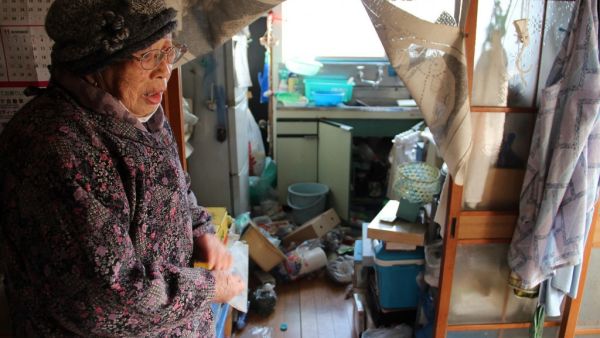A strong earthquake with a magnitude of 7.3 struck off the coast of eastern Japan on Saturday, sparking fears of a 'leak' at a nuclear power plant.
The epicentre of the earthquake was off the coast of Fukushima prefecture at a depth of 60 km (36 miles) and triggered widespread blackouts, the Japan Meteorological Agency said.
The earthquake hit at 11:08 p.m. local time (1408 GMT) and shook houses and offices in Tokyo, and was followed by aftershocks, including a 4.7 magnitude jolt, JMA said. But there appeared to be no major damage and no tsunami warning was issued.
A 7.1 magnitude earthquake struck off the coast of eastern Japan late Saturday evening but there were no immediate reports of casualties or damage https://t.co/K3zWwG9Ksk
— CNN Breaking News (@cnnbrk) February 13, 2021
There were fears that there had been a leak of nuclear fuel at the Fukushima Daini Nuclear Power plant, according to local broadcaster NHK - but this was denied by the facility.
Pool water used for storing spent nuclear fuel reportedly 'leaked into a ditch next to the pool' - and thereby contaminated the surrounding area - after the water overflowed due to the earthquake's tremors, according to Tokyo Electronic Power Company (TEPCO).
But the Nuclear Regulatory Agency said the amount of pool water is small and there was 'no effect on the cooling of nuclear fuel'.
They added that the radiation dose is low, so there is no concern about workers being exposed to it.
TEPCO reported: 'A patrol found that about 160 ml of pool water for storing spent nuclear fuel at Fukushima Daini Nuclear Power Plant Unit 1 in preparation for decommissioning in Fukushima Prefecture had leaked into a ditch next to the pool
'As of 1:40 am, no major abnormalities have been found at the Fukushima Daini Nuclear Power Plant, and there is no change in the values of the monitoring posts that measure radiation levels around the nuclear power plant.'
About 100 people were injured as a result of the earthquake, according to public broadcaster NHK TV, mostly spraining their ankles while falling on stairs and getting cut by broken glass. There were no reports of major injuries.
The Meteorological Agency said no tsunami warning had been issued and the quake had a magnitude of 7.3, raising it from a preliminary magnitude of 7.1.
It hit near the epicentre of a 2011 killer quake which triggered a towering tsunami and killed more than 18,000.
Residents cleaned up clutter in stores and homes on Sunday morning and workers rushed to clear debris from a landslide which has blocked a section of the Joban Expressway in Soma, Fukushima Prefecture.
About 950,000 households were without power on Saturday, Chief Cabinet Secretary Katsunobu Kato addressed reporters after midnight and said evaluations were under way.
He said there were no irregularities at two nuclear facilities, Fukushima Dai-ni and Onagawa. Authorities were still checking at Fukushima Dai-ichi, he said.
A magnitude 7.1 earthquake has occurred in Japan. Sending all of my prayers to everyone in the area. Please keep safe. ?? pic.twitter.com/LIX5Z51BdO
— Maxi?✨⁰³³¹ (@HarutoMyRuto) February 13, 2021
Kato said there was no danger of a tsunami from the quake. He said that some trains in northeastern Japan had stopped running, and that other damage was still being checked.
'As far as damage, casualties and structural damage are being assessed,' he said, adding that sections of the bullet train had been suspended due to power outages.
'Surveys are being done at Fukushima Daiichi nuclear plant,' he said.
'We have received reports that Onagawa nuclear plant and Fukushima Daichi nuclear plant are not showing any abnormality,' he added.
Power had been restored by early Sunday, although some bullet train services were still halted.
Video from public broadcaster NHK TV showed some pieces of a building wall had broken off and fallen to the ground. Items fell off shelves because of the shaking, NHK said.
NHK also said there were no reports of irregularities at another nuclear facility at Tokaimura, in Ibaraki prefecture.
Tokyo Electric Power Company Holdings said there was no change in the radiation levels around its plants.
The quake threw dishes from shelves in houses in the region, but there were no immediate reports of damage.
Images shown online and posted on social media showed broken glass at a shop and items spilled off the shelves at a supermarket.
Renowned author Yu Miri, who lives in Fukushima's Minamisoma city, tweeted a photo of her home, showing books, pot plants and bookcases strewn across the floor. 'My house in Odaka, Minamisoma city is all messed up,' she wrote.
A Reuters cameraman on location in Fukushima said his 10th floor hotel room shook for some time. One man at the hotel was taken to hospital after falling and hitting his head on a door, the cameraman said.
Although injured, the man was still able to walk, the cameraman said.
Local media reported the quake threw dishes from shelves in houses in the region, but there were no immediate reports of damage.
Prime Minister Yoshihide Suga was called to his office, and broadcaster NHK said the government would set up a special liaison office to coordinate with affected regions.
'We will continue to respond, putting human lives first,' Suga told reporters early Sunday, adding there were no reports of serious injuries.
Yasutoshi Nishimura, the minister in charge of economic and fiscal policy, expressed sympathy for those who had suffered damage and injuries.
'The government will continue to do our utmost to respond,' he said.
The quake hit off of Fukushima just weeks before the 10-year anniversary of the March 11, 2011, quake that devastated northeast Japan and triggered a massive tsunami that led to the world's worst nuclear crisis in a quarter of a century.
Earthquakes are common in Japan, one of the world's most seismically active areas.
The country sits on the Pacific 'Ring of Fire', an arc of intense seismic activity that stretches through Southeast Asia and across the Pacific basin.
Japan accounts for about 20 percent of the world's earthquakes of magnitude 6 or greater.
In September 2018, a powerful 6.6-magnitude quake rocked Hokkaido, triggering landslides, collapsing houses and killing more than 40.
This article has been adapted from its original source.








